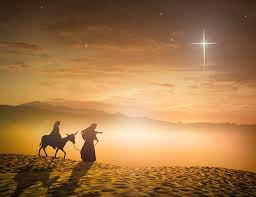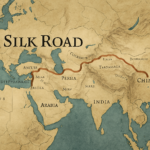
Las Posadas takes place from December 16 to December 24. This nine-day celebration is meant to represent the nine months that Mary carried Jesus in her womb. Each day represents one month of her pregnancy. The final day, December 24th, is known as Nochebuena, or Good Night, and is celebrated with a big feast and the exchange of gifts.
The celebration has been a tradition in Mexico for over 400 years. It was first introduced by Spanish missionaries in the 16th century as a way to teach indigenous peoples about the Christmas story. The tradition has since evolved and has become an important part of Mexican culture.
The word “posada” means “inn” in Spanish. The celebration is meant to reenact Joseph and Mary’s search for a place to stay in Bethlehem. It symbolizes the idea that there is always room for everyone, even the most humble of people, in our hearts and homes.
The celebration reenacts Joseph and Mary’s search for a place to stay in Bethlehem. The procession usually starts with people dressed as Mary and Joseph, accompanied by others carrying candles and singing traditional songs. They stop at various houses along the way, where they ask for shelter, only to be turned away until they reach the final destination.
The tradition was brought to Mexico by Spanish missionaries in the 16th century. The missionaries used the celebration as a way to teach the Christmas story to the indigenous peoples of Mexico. The tradition has since become an important part of Mexican culture and is celebrated throughout the country.
The celebration is particularly popular in Mexico, Guatemala, and parts of the southwestern United States. It has also spread to other parts of the world, including the Philippines and some parts of Europe.
The celebration often involves a procession with people dressed as Mary and Joseph. They are accompanied by other people carrying candles and singing traditional songs. The procession usually stops at various houses, where they ask for shelter, only to be turned away until they reach the final destination.
At each house, there is a ritual where the people inside the house refuse to let the procession enter until they sing a particular song. The song usually ends with the phrase “enter holy pilgrims, receive this humble corner, which though it is poor, I offer it with all my heart.” Once the song is sung, the people inside the house welcome the procession in and offer food and drink.
Once the procession is allowed in, there is a feast with traditional Mexican food and drink. The feast usually includes tamales, ponche (a hot fruit punch), and buñuelos (a type of fried dough). The food is meant to symbolize the hospitality and generosity of the hosts.
Las Posadas is also celebrated in some parts of the Philippines. The tradition was brought to the Philippines by Spanish missionaries in the 16th century and has since become an important part of Filipino culture.
The celebration is an important part of Mexican culture and identity. It is a time for families and communities to come together and strengthen their bonds. It is also an opportunity to reflect on the importance of hospitality and generosity.
The celebration has its roots in indigenous traditions that predate the arrival of the Spanish. The indigenous peoples of Mexico had their own winter solstice celebrations, which were later adapted by the Spanish missionaries to include Christian themes.
In some places, the procession is led by a child dressed as an angel. The angel is meant to symbolize the announcement of the birth of Jesus and the hope and joy that it brings.
In Mexico City, the largest Posada takes place at the Metropolitan Cathedral.Thousands of people gather for the event, which includes a reenactment of the Nativity scene, traditional songs, and fireworks. The procession makes its way through the streets of the historic center of the city, and ends at the Zocalo, the main plaza of Mexico City. The event is televised and watched by millions of people throughout the country.
In some parts of Mexico, it is traditional to break piñatas during Las Posadas. The piñata is often shaped like a star or a seven-pointed object, which represents the seven deadly sins. The blindfolded person who breaks the piñata is meant to symbolize the triumph of good over evil.
Las Posadas is also celebrated in parts of the United States, particularly in the southwestern states that border Mexico. It is often celebrated by Mexican-American communities and is an important part of their cultural heritage.
In some communities, Las Posadas is celebrated with a novena, which is a series of prayers said over nine days. The novena usually includes a reenactment of the Nativity scene and traditional songs.
The celebration is an opportunity for people to come together and strengthen their sense of community. It is a time to share food, stories, and traditions with one another. It is also a time to reflect on the values of kindness, generosity, and hospitality.
In some parts of Mexico, it is traditional to decorate the procession route with luminarias. Luminarias are small paper lanterns filled with sand and a candle. They are placed along the route to light the way for the procession.
The celebration has been adapted and changed over time, but it remains an important part of Mexican culture. It is a symbol of the rich cultural heritage of Mexico and a testament to the resilience and creativity of its people.
In recent years, there have been efforts to revive some of the older traditions associated with Las Posadas. These efforts include incorporating indigenous languages and traditions into the celebration.
Las Posadas is a time for people to reflect on the importance of family and community. It is a time to come together and celebrate the bonds that hold us together as a people.
The celebration is not just about the past, but also about the present and the future. It is a time to look forward with hope and optimism and to recommit ourselves to the values of love, kindness, and generosity.
Las Posadas is an inclusive celebration that welcomes people of all backgrounds and beliefs. It is a reminder that, no matter who we are or where we come from, we all share a common humanity and a common need for love and acceptance.
The celebration of Las Posadas is a testament to the enduring power of tradition and the resilience of the human spirit. It is a time to come together and celebrate the things that make us unique and to honor the traditions that have shaped us as a people.









